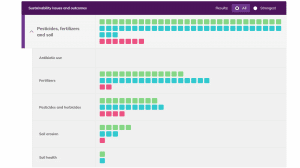Agrochemicals (fertilizers and pesticides) and antibiotics play a critical role in the agriculture, forestry, livestock, and aquaculture sectors. However, overuse of these substances, increasingly common, negatively impacts human and environmental health. Over the last 50 years, global nitrogen fertilizer use surged from 12 million to 109 million tons per year, contaminating surface and groundwater and causing algal blooms that lead to massive aquatic ‘dead zones’. Global pesticide use has almost doubled since 1990 to a current average of 3 kg per hectare of cropland, mostly driven by high use in Asia and South America, and results in the accidental poisoning of as many as 41 million farm workers worldwide every year. Antibiotic use in the livestock sector currently accounts for an estimated 70-80% of global consumption; the indiscriminate use of non-therapeutic antibiotics, often administered to stimulate growth, pollutes the environment and has led to the development of antibiotic-resistant bacteria, with alarming public health implications.
Most market-based sustainability approaches – from certification programs to company sourcing codes and industry roundtables in the beef sector – contain provisions that aim to address these issues. Many agricultural standards ban highly toxic pesticides, include strict requirements for safe handling and storage of other agrochemicals, and promote integrated pest management (IPM) practices that reduce pesticide use. To boost soil health, some standards encourage the use of soil tests to assess fertilizer requirements, promote organic fertilizer use, and include provisions for erosion control. Similar approaches are adopted by company sourcing programmes and in-house sustainability codes. In the livestock sector, some programs ban antibiotics altogether, while others require producers to monitor and reduce antibiotic use over time.
The latest Evidensia review set out to determine whether these market-based sustainability approaches are making a difference in the use of agrochemicals and antibiotics – in other words, whether participants perform differently from non-participants when it comes to a suite of variables such as pesticide use, fertilizer application rates, and the use of antibiotics. Additionally, as soil health has a direct link to agrochemical use – crops grown in healthy, organic-matter-rich soils require fewer pesticides and fertilizers – the review examines the effects of program participation on variables that are central tenets of the regenerative agriculture movement, such as soil organic matter and microbial activity in the soil.
Despite the importance of these outcomes to environmental and human health, this Evidensia report is the first systematic examination of sustainability programs’[i] impact on agrochemicals, antibiotics, and soil health. The review uncovered 16 relevant studies that qualified for inclusion in the analysis. Most of these studies addressed fertilizer and pesticide use; fewer investigated soil erosion and health, and, surprisingly, the search did not find any studies that addressed the impact of market-based sustainability approaches on antibiotic use in the livestock or aquaculture sectors. As with other systematic reviews on the impacts of market-based tools, most of the studies in this review study the impacts of sustainability standards and certification schemes and only two studies (of the 16) looked at other types of market-based tools. The low number of studies found through this review is itself an indication that more empirical research is needed on these topics.
The results of these studies are now available to view on Evidensia’s Visual Summaries page. They reveal that, for agrochemical use and soil health, the impact of participating in a market-based sustainability program is generally either positive or neutral, with a very small number of results indicating a negative effect. Most research was from the coffee sector, with smaller numbers of results available from the cocoa, rice, and cotton sectors. Notably, no research was found that addressed tea, bananas, or palm oil, which are commonly the target of major supply chain sustainability programs and are often criticized for excessive agrochemical use. No studies evaluated antibiotic use in the livestock or aquaculture sectors, despite the public health importance of this topic. This reflects substantial gaps in the research base and consequently our knowledge of how these tools affect antibiotic and agrochemical use in these sectors.

The lack of research on soil health and erosion has a number of possible explanations. As these metrics are more difficult and expensive to measure than, for example, the rates of fertilizer or pesticide application, they may not be targeted by researchers. It’s also likely that the impact of sustainability programs on soil health variables takes many years before it can be detected. Also, the benefits of soil management and erosion control may not be immediately clear to farmers, causing them to prioritize other practices.
The studies that are available, however, provide important information about the role that support strategies can play in enhancing the impact of sustainability programs on these outcomes. For example, multiple studies found that farmer training improved implementation rates, with one study finding that the benefits of training extended beyond certified farms, as producers shared their knowledge and experiences during monthly meetings with other certified and non-certified farmers alike. Research also found that the availability of diagnostic tools like soil tests drives uptake of better soil management approaches and other best practices such as integrated pest management. Conversely, a government policy that subsidized the cost of agrochemicals for farmers resulted in similar fertilizer use on certified and non-certified farms.
Other studies indicate a complex relationship between sustainable practices and productivity: in two cases, farmers were able to increase yields and revenues while adopting more sustainable approaches, while in two others, implementation of more sustainable practices resulted in lower yields, though a price premium offset this effect in one case. These findings indicate that sustainable and regenerative agricultural practices can – but don’t always – result in productivity benefits for farmers and underscore the reality that farmers weigh multiple conflicting forces when choosing which practices to implement. A careful consideration of these tradeoffs is essential to achieve holistic long-term sustainability in the farming sector.
Given that agrochemical management, antibiotic use, and soil health are critical components of many market-based sustainability approaches, more research is needed to understand the contribution of these programs to improving related practices and outcomes. The findings of this systematic review reveal a dearth of evidence on certain topics, particularly antibiotic use and soil health, and certain crops, such as bananas, palm oil and tea. The findings suggest that sustainability programs can boost uptake and implementation of best practices through farmer training and support strategies such as soil diagnostic tests and the dismantling of government policies that promote agrochemical use over lower-impact alternatives.
[i] Organic certification was not included in this review, since this topic has been extensively reviewed previously. This blog provides a useful overview of the evidence base on the impacts of organic certification.

